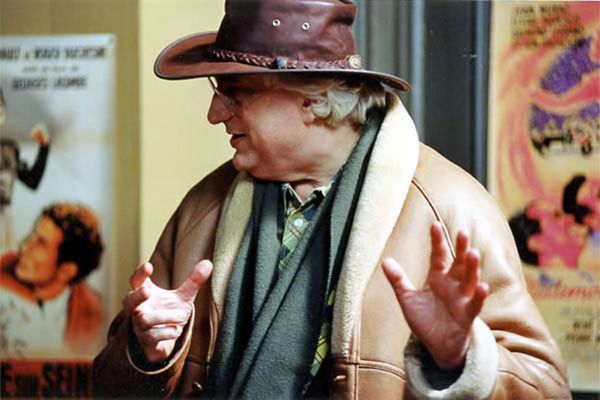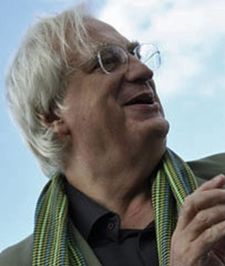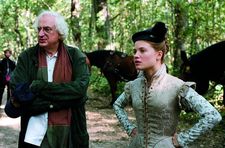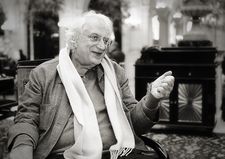 |
| Bertrand Tavernier Photo: French Film Festival UK |
One of the impassioned giants of French film, veteran director Bertrand Tavernier, a human encyclopaedia of all facts cinematic, has just died at the age of 79.
The official announcement was made today by the Institut Lumière in Lyon, his home town. He was proud to be president of the organisation and worked for it alongside Cannes director Thierry Frémaux. Tavernier died in Sainte-Maxime in the Var region of south-eastern France.
Tavernier’s passion for cinema began as a schoolboy in Lyon, where he was born on 25 April 1941. He was the son of Geneviève Dumond and the writer and resistance fighter René Tavernier. In 1950, the family moved to Paris, where the young Tavernier began frequenting the Cinémathèque Française. He had decided by the age of 14 that he wanted to become a filmmaker.
 |
| Bertrand Tavernier Photo: French Film Festival UK |
His love of American cinema was given a kick-start by Gary Cooper who, as a student, he would seek out onscreen. Although he went to the Sorbonne ostensibly to study law, he handed in a blank sheet of paper for the final exam.
His studies had been sidetracked by the movies: he founded a film club, Le Nickel Odeon, with two friends, to show rarities of world cinema. He continued to pursue his serious interest in film in the Sixties as critic for such magazines as Positif and Cahiers du Cinema. He made a few short films during the New Wave - "but they were very bad,” he once told me, “so I stopped. It had become a kind of religion. This was stupid, that everybody should make a film. I decided I was not ready ... that I had to learn about life."
He did so by becoming a successful press agent, working on the promotion of films by the likes of Joseph Losey, Sam Fuller and Claude Chabrol, and marrying Colo O'Hagan, who predeceased him.
“Being a press agent allowed me to go onto the set and watch a lot of directors work, to go in the editing room and learn as much as if I was an assistant director without the ordeal and the horror! I followed that with a Jean-Luc Godard film and my first job was to do the trailer, so I learnt a lot. I also learnt a lot about the distribution of films’” he said.
By 1972 he was ready to take the plunge with his first feature, The Clockmaker Of St Paul, the first of many enterprises with Philippe Noiret which he made in his native Lyon, despite his producer's protestations that it should be shot in Paris.
All his 30 or so films are are suffused with his love for cinema. In addition to being one of France’s foremost auteurs, he was also a renowned film critic and historian who drew from his deep knowledge of classic French and American cinema to create his own uniquely absorbing, finely wrought works. His encyclopaedic book Thirty Years Of American Cinema (written with Jean-Pierre Coursodon) has long been considered one of the best reference works on Hollywood film, and his massive 2008 volume American Friends featured interviews with such legendary directors as John Ford, John Huston and Elia Kazan, as well as the more recent auteurs Quentin Tarantino and Alexander Payne.
His passion for American cinema took him to the States several times, most recently to make In The Electric Mist, a Louisiana-set thriller with Tommy Lee Jones. His love of jazz found a vehicle in the Oscar-winning Round Midnight. He loved making period films and as well as contemporary subjects and the costume epic The Princess Of Montpensier with Lambert Wilson and Mélanie Thierry, dealing with the Catholic-Protestant wars in 16th century France, was one of his favourites as well as such essays as Life And Nothing But and Safe Conduct (Laissez-Passer), about the German Occupation.
 |
| Bertrand Tavernier on the set of La Princesse De Montpensier |
He was accomplished in a wide variety of genres from crime films such as L627 and Fresh Bait to ambitious historical subjects including Captain Conan in 1996 and The Judge And The Assassin in 1976.
He came to Glasgow in 1979 to make the cult success Death Watch, for which he united Harvey Keitel and Romy Schneider for a futuristic odyssey.
No-one wanted to give him the finance so Tavernier was forced to find his production partners outside the UK. Nothing daunted, he came back to the city to start shooting in the summer of the following year. His entourage included Keitel, just turned 40 and reaching the peak of his powers; Romy Schneider, considered one of the most beautiful and intelligent talents of her generation; craggy-faced character actor Harry Dean Stanton; and eminent Swedish thespian Max Von Sydow, as well as Robbie Coltrane in his first movie appearance, a young Bill Nighy, locals Freddie Boardley, Paul Young and Ida Schuster and a host of extras culled from the gallus Glaswegian populace.
A young filmmaker, Iain Smith, was taken on as location manager and helped to persuade the then Glasgow District Council to support the shooting of the film.
Death Watch, based on the novel The Continuous Katherine Mortenhoe by D G Compton, is set in the not-too-distant future. In this world incurable disease has become an anomaly and the dying have become objects of morbid fascination. As part of a media-dominated, violence-obsessed society, the race is on to satisfy the demands of the viewing public. Death Watch is the ultimate reality TV show – where the audience can watch someone dying for real.
With hindsight, Tavernier realised just how prescient the themes had become. He told me: “Yes it was a film that was ahead of its time, but I did not realise that when I made it. I made it because first of all I thought it was a great love story, and it was saying things, which were frightening me. But I was hoping that they would not happen but many of them have come to pass. When I saw it again recently I was surprised how accurate the film, and the statements made in it are – about television, about the way voyeurism was introduced and has become so important in many TV shows. There are other things which are interesting – the teachers who are replaced by computers, books which are written by computer and not by real authors, the way the people who are poor are sent away from the cities, which is something that is happening in many places.”
 |
| Bertrand Tavernier Photo: Peter Rebac |
He took pride and pleasure in the fact that the film still held up to contemporary scrutiny. “The photography by Pierre-William Glenn is stunning; the music by Antoine Duhamel is great, and I love the acting. Romy always said it was one of her favourite films. She wrote to me afterwards saying it was more than a film, it was a little bit of her soul. Harvey has always championed it. When he came to the Cannes Film Festival for The Piano he said the only person who believed in him at that time was Bertrand and Death Watch was his favourite film of that time, along with Mean Streets.”
Tavernier’s relationship with Glasgow and the rest of Scotland has remained firm, and he became a regular visitor. One of the attractions is his admiration for British director Michael Powell (and his collaborator Emeric Pressburger) which saw him follow in their footsteps to Mull, the location of the 1945 classic I Know Where I’m Going.
His knowledge found a worthy outlet in his two part documentary (made when he was 75) My Journey Through French Cinema about landmark films that influenced his own film-making. Asked what had provided the impetus, he said simply: “As I was becoming old enough to see the grave, I wanted to express how grateful I am not only for the joys these filmmakers gave me, but for the fight they put up, the courage they had.” It is just part of the immense legacy that Tavernier has left behind.
He is survived by his son Nils Tavernier (The Finishers), an actor and director, and his daughter Tiffany, a novelist and screenwriter who worked with her father on It All Starts Today and Holy Lola.
Read our interviews with Bertrand Tavernier:
- On The Princess of Montpensier
- On Jacques Becker, Claude Sautet and Jean-Pierre Melville
- In conversation about The French Minister (Quai D’Orsay)
- On A Journey Through French Cinema
- On making The French Minister





















